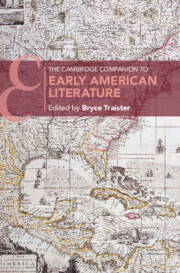Book contents
- The Cambridge Companion to Early American Literature
- The Cambridge Companion to Early American Literature
- Copyright page
- Contents
- Figures
- Contributors
- Introduction
- Part I How to Read (in) Early America
- 1 How to Read Things That Weren’t Written Down in Early America
- 2 How to Read the Natural World
- 3 How to Read Early American Poetry
- 4 How to Read Gender in Early America
- 5 How to Read an Early American Novel
- 6 How to Read Democracy in the Early United States
- Part II Readings in Early America
- Part III Early American Places
- Select Bibliography
- Index
- Cambridge Companions To …
5 - How to Read an Early American Novel
from Part I - How to Read (in) Early America
Published online by Cambridge University Press: 18 November 2021
- The Cambridge Companion to Early American Literature
- The Cambridge Companion to Early American Literature
- Copyright page
- Contents
- Figures
- Contributors
- Introduction
- Part I How to Read (in) Early America
- 1 How to Read Things That Weren’t Written Down in Early America
- 2 How to Read the Natural World
- 3 How to Read Early American Poetry
- 4 How to Read Gender in Early America
- 5 How to Read an Early American Novel
- 6 How to Read Democracy in the Early United States
- Part II Readings in Early America
- Part III Early American Places
- Select Bibliography
- Index
- Cambridge Companions To …
Summary
Can novels change the world, or must they merely inscribe, and thereby fortify, its injustices? Throughout a range of critical approaches, including new aesthetics, sexuality studies, book history, affect theory, environmental humanities, critical slavery studies, Native American and Indigenous studies, network theory, the spatial turn, world-systems, gender studies, network theory, health humanities, and more, tensions run high in early Americanist literary scholarship between a realist conviction that worlds create books and an equally resolute commitment to the possibility that books – especially fictions – create worlds. This chapter hopes to honor, rather than quiet, this critical ferment. To explain without explaining away will be its challenge. To create a place for those early American authors, meanwhile, who have not until recently been recognized in literary studies because their textual creations do not meet normative standards for book-length imaginative prose will be its sustaining goal.
- Type
- Chapter
- Information
- The Cambridge Companion to Early American Literature , pp. 83 - 96Publisher: Cambridge University PressPrint publication year: 2021

